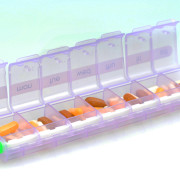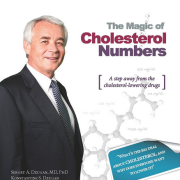Recall that cholesterol is a most vital element in the body. It is the great progenitor, builder of cells and creator of hormones. Obviously, building cells and creating hormones can be considered a pretty good thing for the body, what with that being a necessary component of being defined as alive versus dead. Through long chains of conversions, cholesterol is ultimately responsible for creating more or less that which makes us run properly.
Going back to the issues of cause and effect, we believe that by this rather simple reasoning (and with observational data) a hypothesis can be established regarding hypercholesterolemia. In our hormone deficit hypothesis of hypercholesterolemia, we state that hypercholesterolemia is the reactive consequence of enzyme-dependent down regulation (whenever a cell creates less of a certain component) of steroid hormone creation and their interconversion.1 Simply put, the cholesterol level increases as a compensatory mechanism for the decreased production of steroid hormones. That is certainly a mouthful, but we can break it down quite easily.
Cholesterol creates hormones. What happens when hormone levels decrease, whether naturally via age or through other means? The said compensatory mechanism kicks in and the agent which is responsible for the formation of new hormones is created in greater numbers. Hormones fall, cholesterol production is increased to greater numbers to try and restore the balance. However, this is when the problem arises. The compensatory mechanism is unfortunately trying to fix the wrong thing. The compensatory mechanism has the right idea but is not working on fixing the actual problem. If increased cholesterol requirement to create more steroid hormones was the problem, then this would fix hormone levels. Unfortunately it does not, and steroid hormone levels remain low. Extra cholesterol production does not fix the malfunctioning enzymes.
The body can keep throwing cholesterol at the decreased hormone levels all day, but it is attempting to fix the problem with the wrong means. There isn’t some magical point where suddenly cholesterol becomes less effective. Consider that an optimally balanced body has an optimum level of cholesterol and an optimum level of hormones, for the body in question (this is important, because the human body is not a statistical variable and everyone is unique). If the problem arose from an increased need of cholesterol, then logically the increased level of cholesterol would in turn raise hormones to an optimal level. This is not the case.
Cholesterol increases, but hormone levels stay low. The underlying fault working, or not working in this case, is the enzymes that are responsible for the myriad of interconversions through which cholesterol turns into hormones (which are converted into other hormones, also via enzymes). The building supplies are increased, but the problem is not a lack of supplies but instead the construction workers not putting the building supplies in their place via proper application. As a consequence, the body keeps the level of cholesterol elevated accordingly. In this sense, cholesterol takes on more than ever the function of a biological marker. The elevated level shows that the production of hormones is not optimized according to the needs of the body in regards to hormones.
From our point of view, in such a situation the most optimal steps to take would lead to the restoration of normal enzyme function, such as the enzyme that converts cholesterol into pregnenolone or the various enzymes that control other hormonal interconversions. In the case of an enzyme deficiency, they can be simply replaced or restored. This will allow for the restoration of normal physiological pathways instead of their suppression. We think that drug companies should focus on such an approach instead of trying to disrupt the body’s normal physiology.
While speaking of cholesterol disorders, we can look at hypocholesterolemia. The work flow, so to speak, is reversed in this situation. While hypercholesterolemia is caused by low steroid hormone production, hypocholesterolemia causes low steroid hormone production. The hyper version sees a situation where the building blocks start to pile up because there is not enough builders to route them as needed, while the hypo version is a situation where there aren’t enough building blocks in the first place.
In other words, there are many paths to a malfunctioning system. A very easy example would be a statin drug, which interferes with HMG-CoA reductase, which has the overall effect of disrupting cholesterol production. Thus, the level of hormones decreases due to the lower level of cholesterol. This happens because there is less of what we can describe as the steroid hormone building block to go around.
One could argue, however, that this is an artificially created impediment to the regular function of the system. If someone were to shoot you in the arm, then the movement of that arm will be impaired. Your arm now suffers a handicap that was not there initially due to this outside force. How does this take into account individuals who naturally have lower levels of cholesterol? Once again, the uniqueness of each human being must be pointed out. Many malfunctions can occur in the long pathway of conversion before cholesterol is even formed.
Cholesterol is not simply created as a whole particle and let loose upon the body. Bits and pieces join together and convert into other parts with the help of various agents. All it takes is just one of those steps or parts not working to their full potential to cause a cascading chain reaction of impaired production.
To learn more about cholesterol and the effect it has on your body, purchase Dr. Dzugan’s book “The Magic of Cholesterol Numbers” on Amazon.
Get your FREE e-Book today, Dr. Dzugan’s “Your Blood Doesn’t Lie” and learn more about our program and how it can help you.
Because every person’s body chemistry is different, we work closely with you to develop a personalized program that improves your overall Quality of Life.
Scroll to the bottom of the Dzugan PhysioLogic home page and grab your free ebook, a free consultation with one of our Doctors, or just give us a call at 1-866-225-4877 Option 2 today to speak with an experienced advisor.
DISCLAIMER: This blog is for informational purposes only. It does not replace medical care from a licensed physician. If you have a medical concern, please contact DzLogic at 1-866-225-4877.











